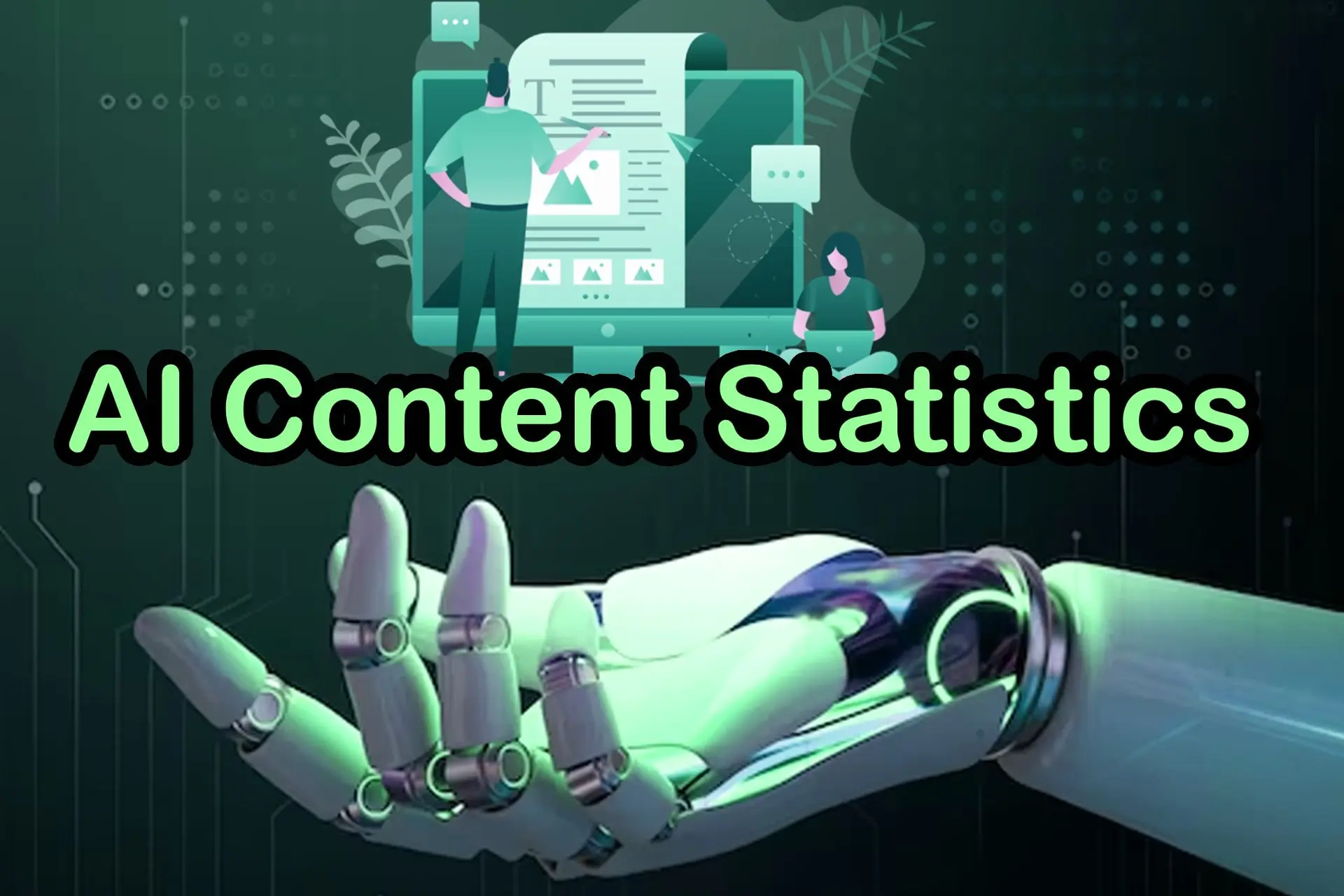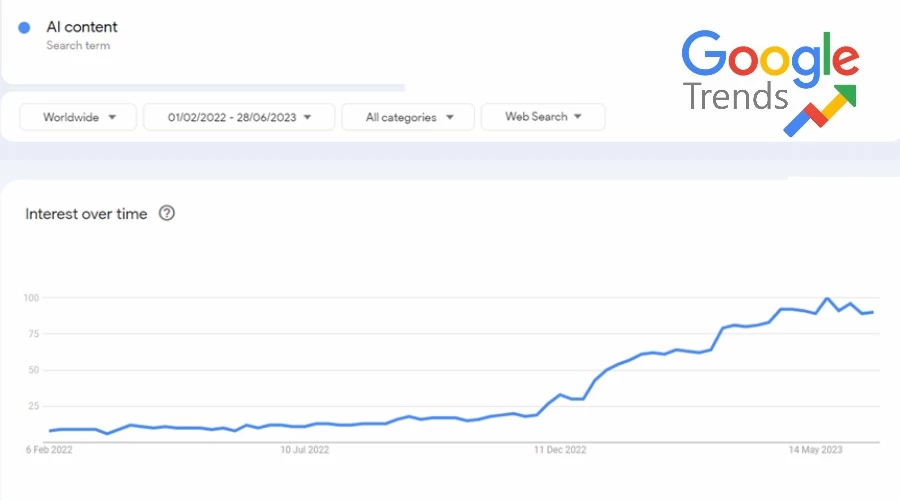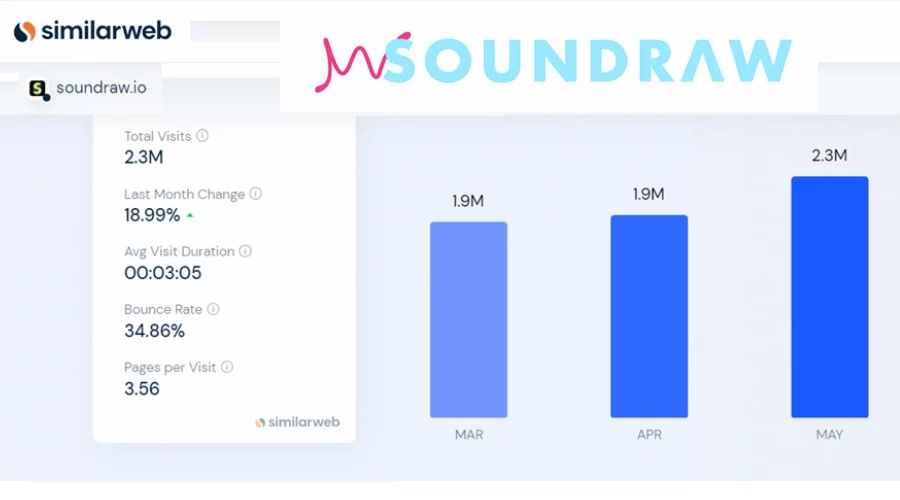22 Eye-opening AI Content Statistics

The rapid growth of AI content is changing the landscape of education, professional content creation, and countless industries alike.
With speed, scalability, and automation, even the most cynical can no longer ignore the technology.
The following AI content statistics shed light on the popularity of AI generators, how AI content is being used in industries like marketing, and the genuine concerns people have.
AI Content Statistics You Should Know
Here are the top 5 stats about AI content everyone should know:
- Since February 2022, web searches related to AI content increased by 900%.
- Half of business leaders now use AI for content.
- AI in marketing is expected to be a $107.5 billion industry by 2028.
- 82% of content creators surveyed think AI content is as good as human-generated content.
- 86% of digital marketers believe content writers will lose jobs because of AI.
AI Content Usage Statistics
These AI content statistics look at Just how popular AI-generated content is and who is using it.
1. Since February 2022, web searches related to AI content increased by 900%.
(Source: The Brains, Google Trends)
Even before the likes of ChatGPT went live to the general public, interest in AI content was high. In the 6 months between February and August 2022, there was a 270% increase in web searches.
Using Google Trends data from February 2022 to June 2023, interest in ‘AI content’ has risen a staggering 900%.
2. Half of business leaders now use AI for content.
(Source: SiegeMedia)
52% of business leaders are currently using AI content generation tools as part of their content marketing strategy, while 64.7% will have tried it by the end of 2023.
3. Nearly a third of college students admit to using ChatGPT to complete written homework.
(Source: Intelligent.com)
One of the most common uses of AI content is in education. A recent study suggests 1 in 3 college students have used ChatGPT for homework assignments, while 60% of those use it to generate content for more than half of all their assignments.
4. Written AI content dwarfs AI image content.
(Sources: Reuters, OpenAI)
AI has the ability to quickly generate both written content and images, though written content is far more common. For example, OpenAI’s chatbot ChatGPT had 100 million users last time the figures were released.
The latest figure for its AI image generator DALL-E was 1.5 million users.
5. AI music content is the next big thing.
(Source: SimilarWeb)
It is expensive to license music and difficult to find royalty-free tracks, so AI is now filling the gap in the market and allowing users to generate unique royalty-free music.
The most popular service SoundDraw had 2.3 million visitors in May followed by Boomy (948.5K), and Soundful (768.5K).
6. 23% of US book authors are using AI.
(Source: Statista – Authors AI)
Although it goes hand-in-hand, AI content is not just reserved for the internet. Even 23% of traditional book authors are using AI to aid the writing process. 47% use it to maintain good grammar, while 29% use AI to help generate plot ideas and characters. However, less than 10% actually use it to do the raw writing.
7. Only 8% of newsroom executives see AI being used for content creation and quality improvement.
(Source: Statista – AI Newsrooms)
As consumption of traditional news media continues to drastically decline, the industry still prides itself on its ability to break factually accurate stories and write high-quality content. This may be why only 8% of newsroom executives see AI as a tool to improve quality and generate text for stories. A much larger percentage (50%) see it only as a supportive tool for research, ideation, and workflow.
AI Content Statistics in Marketing
If any industry has gone all in with AI content, it’s marketing. These stats look at the scope of AI in marketing, how it is used, and what marketers think about the results.
8. 73% of marketers use AI to some degree.
(Source: MarTech)
Upwards of 73% of both B2B and B2C marketing executives have embraced generative AI at their companies. 31% of holdouts expect to jump on the bandwagon within a year and 46% within two years.
9. AI in marketing is expected to be a $107.5 billion industry by 2028.
(Source: Statista – AI Marketing Revenue)
The use of AI in marketing is said to already be worth $15.84 billion. By 2028, this is expected to grow massively to $107.5 billion. As well as content creation, automation, campaign personalization, and data analysis, are all areas that AI is being applied to.
10. 33% of marketers that use AI use it to help generate content ideas.
(Source: HubSpot)
Only 28% of marketers that use AI, use it to actually write content directly. More people (33%) prefer to use it as a companion tool to spark ideas and creativity.
Text content is the most common use, whereas only 26% of marketers use AI to generate image content.
11. More than half of those surveyed think AI will improve written content.
(Source: Forbes)
One of the key benefits of AI is it doesn’t get tired, it has no distractions, and it doesn’t leave any room for interpreting the principles of writing. It simply takes the rules it’s given, and even learns as it goes, then performs consistently every time. It’s no surprise that 54% believe it improves written content and enhances efficiency.
12. 82% of content creators surveyed think AI content is as good as human-generated content.
(Source: Capterra)
The vast majority of those that do use AI directly for written content say the results are just as good as human-generated content. This certainly makes sense from a technical standpoint, as AI can easily apply grammar and style rules. However, there are still concerns over the quality of the content itself.
13. Jasper AI is the most popular AI content tool for marketers.
(Source: Influencer Marketing Hub)
Although ChatGPT is the most used AI tool overall, professional marketers require specific content creation features. For this purpose, Jasper AI is the most popular (32.8%), followed by ChatGPT itself (22.4%), Copy.ai (9%), and Frase.io (9%). A range of other tools makes up 26.9% of marketer AI usage.
Concerns and Worries about AI Content
These AI statistics reveal that not all perceptions of AI are positive. Job losses, inaccuracies, and deception are common AI content concerns.
14. Over 75% of people worry that AI content will misinform them.
(Source: Forbes)
A major area of concern when it comes to AI and content, is its accuracy. Results may be grammatically and stylistically accurate, but factually, they are only as good as the underlying training data. For example, ChatGPT has not been trained on data beyond September 2021.
15. 48% of those surveyed do not believe AI-generated images of people should be used in marketing content.
(Source: Statista – AI Marketing)
Is it morally acceptable to use AI-generated images of people and faces in marketing? Is it deceptive and will real humans lose modeling jobs? These and other concerns lead nearly half of survey respondents to be against the idea.
16. The primary concern about AI use in newsrooms is the inaccuracy of information.
(Source: Statista – AI Newsroom Concerns)
85% of newsroom executives believe AI would be a problem for information accuracy. To a lesser extent (65%) are worried about the potential for plagiarism and copyright infringement, while 38% see AI as a threat to jobs.
17. At least 49 ‘news’ websites were found to be mostly AI-generated.
(Source: NewsGuard – AI News)
While fake and poor-quality news on the internet is nothing new, there’s a growing problem of news-style sites generating their content with AI and little editorial oversight.
According to a recent investigation by NewsGuard, 49 websites including CelebritiesDeaths.com, TNewsNetwork.com, and CountyLocalNews.com, were found to be content farms masquerading as news.
18. Over 140 major brands are paying for ads alongside AI-generated content.
(Source: NewsGuard – AI Ads)
Low-value AI-generated web content is making money from advertisers, including more than 140 major brands who are likely unaware. 90% of these ads were served by Google, despite its own policy of prohibiting advertising on “spammy automatically generated content.”
19. 81.6% of digital marketers believe content writers will lose jobs because of AI.
(Source: Authority Hacker)
If AI models can generate human-like text, automate content creation, and scale output rapidly, it’s no surprise that most digital marketers think content writers are going to lose jobs. Additionally, AI can analyze data, trends, and user preferences to create unique content, further challenging the role of traditional content writers.
20. 54.9% of respondents suspect AI content has been sent to them from a service provider.
(Source: Authority Hacker)
If you use a service to provide content, you probably don’t want it to have been generated by AI, especially if you are paying for it. However, it is becoming increasingly common to suspect service providers are passing off such content as their own. In response, tools now exist to identify potential AI-generated content.
21. AI content shared by artists and musicians on social media is more appealing than content from any other creators.
(Source: Statista – AI Social Media)
Since everyone has access to AI, it has not become a shortcut to fame or success. Research shows that content created by existing artists and musicians has greater appeal (25%) on social media than the average person (19%). Interestingly, AI content promoted by social media influencers is even less appealing than everyday people (18%).
22. AI saves Netflix $1 billion a year.
(Source: The Motley Fool)
Netflix recently came under fire for using AI to generate the backgrounds for its Anime short, The Dog & The Boy. While this shift to AI content creation is seen as a cynical cost saver, the company is actually saving $1 billion a year by using AI algorithms to keep users engaged via personalized recommendations and other account features.
Conclusion
Everything from written content and imagery to music and coding is being disrupted by AI.
As this AI content continues to gain momentum, creators must learn to adapt their skills, embrace collaboration, and explore new creative opportunities.
With billions of dollars at stake, AI content isn’t going anywhere soon.
Sources
- The Brains
- Google Trends
- SiegeMedia
- Intelligent.com
- Reuters
- OpenAI
- SimilarWeb
- Statista – Authors AI
- Statista – AI Newsrooms
- MarTech
- Statista – AI Marketing Revenue
- HubSpot
- Forbes
- Capterra
- Influencer Marketing Hub
- Statista – AI Marketing
- Statista – AI Newsroom Concerns
- NewsGuard – AI News
- NewsGuard – AI Ads
- Authority Hacker
- Statista – AI Social Media
- The Motley Fool
Read our disclosure page to find out how can you help MSPoweruser sustain the editorial team Read more






User forum
0 messages